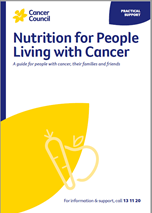- Home
- Pancreatic cancer
- Managing your diet and nutrition
- Enzyme replacement supplements
Enzyme replacement supplements
The pancreas produces digestive enzymes to help break down food. When you have pancreatic cancer, or have had pancreatic surgery, your body may not be able to make enough of these digestive enzymes. This will affect your ability to digest food, particularly fat and protein, and to absorb vital nutrients.
This is often called pancreatic exocrine insufficiency (PEI).
Signs of PEI and how to manage it
Signs of PEI include:
- abdominal pain
- bloating and excessive wind
- diarrhoea or pale, oily stools that are frothy, loose and difficult to flush
- weight loss
To help prevent these symptoms, your doctor will prescribe pancreatic enzymes (e.g. CREON). This therapy may be called pancreatic enzyme replacement therapy or PERT. Sometimes, acid-suppressing medicines are also used. The PERT dose will be adjusted depending on your symptoms and diet. It may take time to get this balance right. A dietitian can help you and your doctor work out the correct dose of PERT.
Taking enzyme supplements
- Take enzyme capsules with water and the first mouthful of food to ensure adequate mixing. With larger meals or meals that take longer to consume (more than 15–20 minutes), you may also need to take them halfway through the meal.
- Always take enzymes when having food or drink that contains fat or protein. Slightly higher doses may be needed with high-fat meals (e.g. fried foods, pizza). You don’t need to take enzymes for simple carbohydrates that digest easily (e.g. fruit, fruit juice, black tea, coffee).
- Take enzyme supplements as prescribed. Do not change the dose without first talking to your doctor or dietitian.
→ READ MORE: Tips for maintaining your weight
Podcast: Appetite Loss and Nausea
Listen to more episodes from our podcast for people affected by cancer
Prof Lorraine Chantrill, Honorary Clinical Professor, University of Wollongong, and Head of Department, Medical Oncology, Illawarra Shoalhaven Local Health District, NSW; Karen Baker, Consumer; Michelle Denham, 13 11 20 Consultant, Cancer Council WA; Prof Anthony J Gill, Surgical Pathologist, Royal North Shore Hospital and The University of Sydney, NSW; A/Prof Koroush Haghighi, Liver, Pancreas and Upper Gastrointestinal Surgeon, Prince of Wales and St Vincent’s Hospitals, NSW; Dr Meredith Johnston, Radiation Oncologist, Liverpool and Campbelltown Hospitals, NSW; Dr Brett Knowles, Hepato-Pancreato-Biliary and General Surgeon, Royal Melbourne Hospital, Peter MacCallum Cancer Centre, and St Vincent’s Hospital, VIC; Rachael Mackie, Upper GI – Clinical Nurse Consultant, Peter MacCallum Cancer Centre, VIC; Prof Jennifer Philip, Chair of Palliative Care, University of Melbourne, and Palliative Medicine Physician, St Vincent’s Hospital, Peter MacCallum Cancer Centre and Royal Melbourne Hospital, VIC; Lucy Pollerd, Social Worker, Peter MacCallum Cancer Centre, VIC; Rose Rocca, Senior Clinical Dietitian – Upper GI, Peter MacCallum Cancer Centre, VIC; Stefanie Simnadis, Clinical Dietitian, St John of God Subiaco Hospital, WA.
View the Cancer Council NSW editorial policy.
View all publications or call 13 11 20 for free printed copies.
